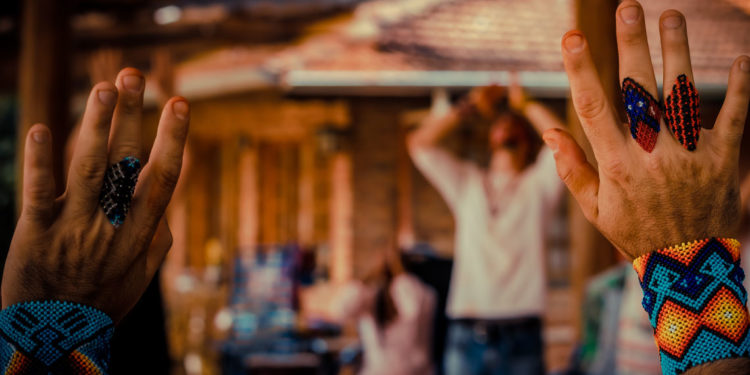Ayahuasca users report psychological benefits after taking placebo at a ritualistic ceremony
by Beth Ellwood
November 20, 2021

At least some of the mental health benefits tied to ayahuasca ceremonies can be elicited by placebo, according to findings published in the journal Psychopharmacology. The study found that ayahuasca users reported reductions in stress, anxiety, and depression following an ayahuasca ceremony, regardless of whether they had been given a placebo or a dose of ayahuasca. Those who did ingest ayahuasca, however, uniquely demonstrated increased empathy.
Ayahuasca is a hallucinogenic drug traditionally used by Amazon tribes during spiritual practices. More recently, ayahuasca retreat centers have opened up around the world, and Westerners have become increasingly interested in the drug. The beverage, which contains N,N-dimethyltryptamine (DMT) and β-carboline alkaloids, induces altered states of consciousness and can trigger hallucinations.
Placebo-controlled clinical studies have suggested that ayahuasca has therapeutic benefits, showing that the drug can reduce symptoms among patients with depression. But study authors Malin Uthaug and her team were interested in exploring the effects of ayahuasca among a non-clinical sample of ayahuasca retreat participants. As of yet, such naturalistic studies have not been placebo-controlled, but there is reason to believe that ayahuasca ceremonies may be particularly susceptible to expectation effects. These rituals are conducted in a group setting led by facilitators, a context that likely influences participants’ experiences with the drug.
The researchers visited six different ayahuasca retreats and focused their study on attendees who were in training to become future facilitators. To better observe the ceremony, these students are sometimes given a placebo by retreat organizers in place of ayahuasca. The participants were 12 men and 18 women with an average age of 40, all of who had previous experience with ayahuasca. The retreat organizations randomly assigned the trainees to receive either ayahuasca or a placebo substance. The participants were not told which they received.
The ceremonies were led by facilitators who gave instructions, played music, and sang throughout the sessions. The ayahuasca students completed questionnaires before attending the ceremony and again the day after the ceremony. The surveys included measures of empathy, ego dissolution, depression, anxiety, stress, and altered states of consciousness.
The researchers found that participants in both the placebo and the ayahuasca groups reported decreases in anxiety, depression, and stress. For the most part, the decline in symptoms was statistically similar among both groups, suggesting that participants experienced a similar reduction in symptoms whether or not they had been given ayahuasca. However, participants in the placebo group experienced a slightly stronger reduction in depression symptoms, while participants in the ayahuasca group uniquely experienced increased empathy toward negative stimuli.
Scores for ego dissolution and altered states of consciousness were on the low end among both groups, suggesting that participants may have needed a higher dose of ayahuasca to reach a stronger hallucinogenic experience. The study authors say that the doses of DMT given to participants were indeed lower than those given during clinical trials.
Furthermore, all participants were experienced users of ayahuasca and may therefore have needed a higher dose of the drug to obtain psychedelic effects. The psychological benefits of ayahuasca may have been more apparent at a stronger dose. The researchers also note that participants were aware that they might be given a placebo, and may have lowered their expectations for the effects of the drug and thus reported a less intense psychedelic experience.
Still, Uthaug and her colleagues say their study speaks to the importance of including a placebo condition when exploring the effects of ayahuasca. They say that the ayahuasca ceremony’s supportive group atmosphere may have offered psychological benefits to participants, independent of the drug.
The study, “A placebo-controlled study of the effects of ayahuasca, set and setting on mental health of participants in ayahuasca group retreats”, was authored by M. V. Uthaug, N. L. Mason, S. W. Toennes, J. T. Reckweg, E. B. de Sousa Fernandes Perna, K. P. C. Kuypers, K. van Oorsouw, J. Riba, and J. G. Ramaekers.
https://www.psypost.org/2021/11/ayahuasca-users-report-psychological-benefits-after-taking-placebo-at-a-ritualistic-ceremony-62136
Thanks to: https://www.psypost.org
Related posts:
Views: 0
 RSS Feed
RSS Feed

















 November 24th, 2021
November 24th, 2021  Awake Goy
Awake Goy  Posted in
Posted in  Tags:
Tags: 
















